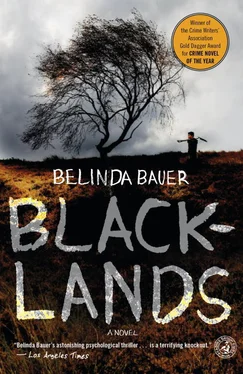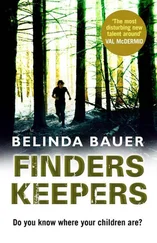It was 5:30 A.M. and he felt stupidly as if he were six years old again and waking up to a Christmas he thought would never come.
Steven grinned to himself. Christmas in June. He’d felt this way every day for the past week—sliding out of bed over Davey, who was spread out like a starfish caught in sheets, stepping over the creaky board outside Billy’s room, holding on to the banister to control the fall of his feet on the stairs. Then shivering a little—partly as the warmth of sleep gave way to the cool new day on his skin, partly with excitement—as he padded quickly into the kitchen where sunlight scattered shafts of golden dust through the window.
And all because of the tiny green shoots that had started to appear like little emeralds sprinkled in the dark loam of the vegetable patch.
The carrots had come first and Steven’s throat had closed up to see them. He almost cried! Over stupid carrots! He didn’t even much like carrots!
He tried not to show his excitement when he told Uncle Jude about the carrots but Uncle Jude had been excited all by himself, and had immediately got up from his bacon to come and see. Steven had felt like a man showing off his new baby. He’d felt the need for a cigar. Instead Uncle Jude had put a hand on the back of his neck, which was even better.
After the carrots, the beans made an appearance at the foot of the poles they’d tied into wigwams. Right now it seemed impossible that the helpless little specks of green could ever scale the heights of wigwam-land. Steven was filled with amazement that they would even try.
He’d wondered what would be next.
It was the potatoes.
But before that—three days after the first carrots appeared—Steven had come in from school and Nan had not been in the window.
Terror had clutched his heart but he tried not to run through the house shouting her name.
“Nan?” he’d called up the stairs. No answer. He’d gone halfway up and seen the toilet door was half open. She wasn’t in there.
Nobody was home.
Steven hurried through to the kitchen and stood still in astonishment.
Nan was in the vegetable patch. She was peering at the shoots and poking the earth now and then with her stick. Not in a mean way, Steven realized, but in the same way he’d seen her poke at the all-terrain wheel on her trolley.
The same trolley that Nan now gripped for support as she rolled and swayed slowly back down the bumpy garden.
I’ll make her a path, Steven had thought, a smooth path.
Then he’d run, back through the house and out of the front door, grabbing his schoolbag on the way.
A short while later he’d waved hello to his tight-lipped grandmother, motionless in the window, and let himself into the house for the second time in ten minutes.
This memory made Steven sightless until he was halfway up the garden, and then he stopped suddenly.
The beanpoles had fallen down.
He hurried the rest of the way, tamping down the unease that had started in his stomach.
The beanpoles hadn’t fallen down. They’d been pulled up and scattered across the rest of the vegetable patch.
Or what was left of it.
Something large and heavy had trampled and gouged the soft black earth, kicking up little seedlings that now lay scattered like bodies on a battlefield, their bright green uniforms failing to cover the naked, spindly limbs beneath that should never have been exposed.
Steven wanted it to be a fox. Or a cow. He even looked about the garden for an escaped cow. A cow would be bad, but not as bad as the bald fact that a person had done this. Person or people.
The hoodies. The hoodies would do this. In his mind Steven could imagine them stomping and laughing as they mashed the tender shoots underfoot, their shadowed faces twisted with stupid humor.
But even as he tried to convince himself of that, Steven knew that the hoodies didn’t care enough to do this—or know him well enough to think he’d care.
In his plummeting heart, Steven knew it was Lewis.
Chapter 29

BECAUSE OF THE DISTURBANCE IN THE KITCHEN, BECAUSE RYAN Finlay had been rushed to hospital—and from there to the morgue—and because Avery had locked the gate in the chain-link behind him, it was almost an hour before he was found to be missing and not just banged up in the wrong cell or hiding somewhere for his own safety. And it was another twenty minutes before a screw spotted Toby and Yasmin and anyone realized that Arnold Avery had gone over the wall.
Since being promoted from his post as assistant governor at Newport Open Prison in South Wales, the governor of Longmoor had lost four prisoners. Four in four years. It was not a shockingly high number. Longmoor was a training prison; a few select prisoners were even sent to work outside the walls on cleaning details or farm duties as part of their rehabilitation. Understaffing meant that on two occasions a couple of men had simply ducked behind a bit of machinery or wandered off into a thick mist. All four had been recaptured on the roads before any driver would stop for them.
But four escapes in four years had the unfortunate ring of a pattern to it. As if it might be five escapes in five years, six in six years, and so on, and that gave the governor palpitations.
So, once Avery’s escape was detected, every available officer was immediately dispatched onto the roads, and roadblocks were established to search cars leaving the area. It was assumed that—like those before him—this particular escapee would head for the nearest road, then flag down or steal a car. To do anything else was stupid and dangerous, even in summer.
Having taken this view, the governor then took another: escapes reflected poorly on prison staff and that led to a lowering of staff morale.
The governor was a good man, and wanted to keep morale as high as possible.
If only Avery could be recaptured within the next few hours. If only the fact that a formerly notorious child killer had gone over the wall could be kept out of the press until he was safely back within those very walls…
The governor was a good man.
But he made a bad choice.
He didn’t call the police.
Arnold Avery’s first half hour of freedom after eighteen years in prison was the worst thirty minutes of his life.
As soon as he straightened up from the twelve-foot drop, he panicked.
The feeling grabbed him by the throat and squeezed, and he ran blindly onto the moor, his terror making him whine with every snatch of out-of-shape breath. His legs burned, there were daggers in his lungs; even his arms ached from running—all within four hundred yards of the wall. Years of sitting in his cell, thinking, had done nothing for his muscle tone.
He stumbled and panted and whimpered until his own self-loathing finally slapped the panic down and forced him to stop, regain control, and take stock.
His panic was groundless. However many times he looked back, he saw no sign of pursuit. The prison itself had melted away behind him like a bad dream.
Built in a large natural hollow, Longmoor Prison was a village-sized stone monstrosity that was barely visible to the thousands of walkers and tourists who roamed the moors each summer. One minute they would be striding out with only short yellow grass and pale granite outcrops for company; the next they’d be gazing down on the huge dark grey wheel inside a crater, often only the pitched roofs and chimneys jutting up through the fog, as if the whole prison was sinking into a lake of dirty milk.
Out here now, with the prison disappeared and only the sunny moor around him, Avery felt his panic shredded and scattered by the bracing breeze. In its place he felt the sudden, laughing excitement of being free.
Читать дальше
Конец ознакомительного отрывка
Купить книгу













